Introduction
The main objective of this report is to analyze the consumer behaviour in the consumer electronics market and this paper concentrates on the Sony Corporation. The first part of this paper focuses on the background of the company, product line, and suggested actions to influence UK consumers’ attitude, and motivate customers to purchase electronics of Sony. On the other hand, the second part of the report emphasized the multimedia strategy to report the director regarding key external factors that influence the UK consumer around products of Sony.
Consumer Behaviour in the Consumer Electronics Market
Company Background
Famous Japanese multinational Company ”Sony Corporation” was established on May 7, 1946, and Sony listed on the Tokyo Stock Exchange (TSE) in 1958. However, Sony Corporation is the world’s largest media conglomerates having revenue of approximately ¥7,214.0 billion and this company is one of the biggest manufacturers of the electronics items and worldwide top 20 semiconductors leader of sales. It manufactures different types of products like video cameras, digital still cameras, DVD – Video players/recorders, digital broadcasting receiving system, Smartphone, LCD Televisions, projection and CRT televisions, PC, printer system, audio, video monitors, professional equipment, CCD, LCD, semiconductors, batteries, optical pickup, audio, video, data recording media, data recording system etc.
According to the annual report 2010, Sony Corporation would like to launch a new generation of television “Sony Internet TV” with outstanding features by sharing the technology with Google, which will ensure all the facilities of internet service. At the same time, it is going to introduce numbers of eco-friendly products in the electronics market like Low energy- high-performance TV screens, the Crank N’ Capture video camera, the next generation of TV display, Crank N’ Capture – video camera, Push Power Play and so on. However, the company should take actions to influence consumer as the net sales income from the electronics sector reduced dramatically; for instance, its sales revenue has decreased by 1.7 trillion from 2008. The following information gives a clear perception of the financial position of Sony –
The following graph will show the Position of products-
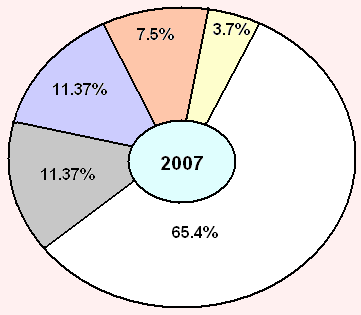
Explanation:
- Electronics = 65.4%
- Game = 11.7
- Picture = 11.7
- Financial services = 7.5
- Others = 3.7
Perceptions
Schiffman & Kanuk (2007, p. 172) and Militaru (2010, p.2) stated, “Perception is the process by which a person chooses, organizes, and interprets stimuli into a meaningful picture of the world” and these perceptions may be same in the different community due to selective attention, selective distortion and selective retention. However, every day an individual may observe more than thousands of ads but it is not possible for that person to pay attention to all these stimuli; therefore, the marketers have to work hard to attract customer’s attention towards their brands. Besides, stimuli do not always come across in an intended way while particular information already exists in the mind or individual interprets the information in his way, which supports existing believe (Kotler & Armstrong, 2006, p.148).
The UK Trade & Investment (2010, p.2) compared between the customers of the UK and customers of other EU countries and reported that the United Kingdom is the market leader for consumer electronics market in entire Europe by holding 22% share of the European market in 2009 and retail sales revenue from such electronics products was around £10.0 billion. However, the UK Trade & Investment further reported that people of this country would like to spend more per head on cutting-edge product categories, for instance, mobile, handsets, HD -ready TVs and Blu-Ray players; as a result, the customer electronics segment in this country encompasses a wide range of firms. Both national and international companies have operated with similar products, so Sony Corporation needs to create positive perceptions to increase market demand as well as influence UK customer towards its products.
Recommendation to influence UK consumer
These suggestions would help the Sony Corporation to take actions to influence UK consumer perceptions around the company and its new consumer electronics products –
- At first, the marketer of Sony Corporation should concentrate on the present lose projects and try to recover its market-leading position;
- However, it should follow divestiture strategy for the loose projects or stop the operation of such projects those are no feasibly profitable or fail to contribute the overall brand standing in the UK electronics market;
- It has already taken initiatives to develop new products for UK market, so it should develop customer perceptions as they would like to more for the new products such as the difference of these products with other companies’ similar products;
- Most importantly, the marketer of this company should refurbish its departments as these departments have a direct influence on creating strong buyer perception for this company in terms of R&D, design, and marketing.
- On the other hand, Sony needs to increase the marketing activities to the boardroom and facilitate marketing to be a market leader in UK electronics market by changing present strategies (Roll, 2011);
- The marketers of Sony have to face problem to create perception, as an individual will forget much that they learn, so they can create a brand image by subliminal advertising and this system would be effective though viewers will not consciously recognize all the messages.
Attitudes and personality
Peter & Olson (2005) expressed that attitude is a learning predilection, which directs to behave consistently either in support or in opposition to a given object and Sciffman & Kanuk (2007) further pointed out that the consumers in relation with any given object might possess different attitudes based on specific situation or usage. As a result, it is important to consider the situation that would result in UK consumers’ behaviour regarding the Sony Corporation and its new eco-friendly products as the market share of this company is extremely depends on building positive attitudes of consumers.
On the other hand, Hitt, Ireland & Hoskisson (2001) stated that personality is the combination of internal psychological characteristics of any person that exerts and reflects how the person interacts with this environment, and Peter & Olson (2005) further argued that the personality of consumers usually determines how consumers respond to the promotional efforts of a product and how to consume the product. However, personality can change, so, the marketers of Sony Corporation have to ensure its consistency to its consumer’s personalities using product offerings and promotional activities.
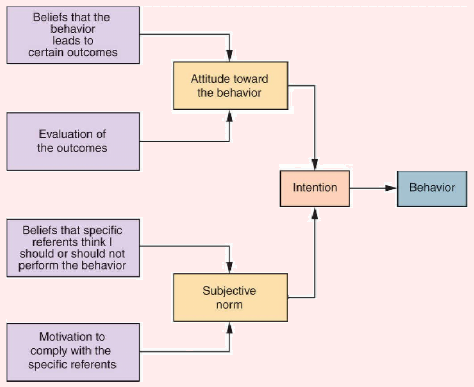
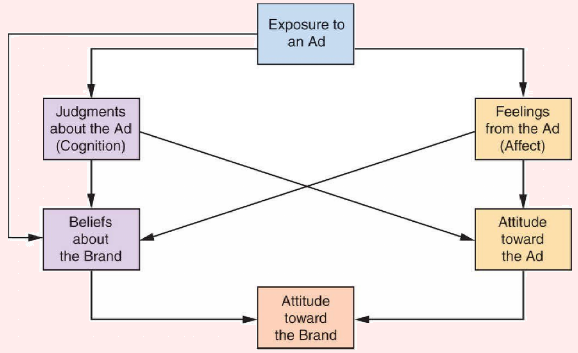
However, Sciffman & Kanuk (2007) also pointed out social factor influence customers to purchase specific products, for instance, the higher class will be to buy the preferred brand most of the case. At the same time, cost-effectiveness is highly correlated with the status of consumption; therefore, the marketers of Sony have to be more cautious to determine pricing strategy.
Recommendation to influence UK consumer
The following suggestions would assist the marketers to take actions to influence UK consumer attitudes towards Sony and its new electronics products –
- The marketers of Sony should highly focus on the direct marketing programs to target UK consumers but they must consider psychographics or geographic profiles;
- Also, increasing direct marketing efforts have an excellent chance of favourably influencing target consumers’ attitudes, because products offered and promotional messages conveyed are very carefully designed to address the individual segment’s needs and concerns;
- The marketers of Sony should more emphasis on the environmental factors in the advertisements and should include how these new products would save energy and reduce pollution;
- The marketers of Sony should resolve two conflicting attitudes as discomfort or dissonance occurs when a consumer holds conflicting thoughts about a belief or an attitude object;
- One way if changing attitudes in favour of the product are by showing people that it can serve a utilitarian purpose that they may not have considered, for instance, Sony can explain that new products are eco friendly and save energy;
- To change the attitude of UK customers, the marketers should survey the UK electronics market and change the product features considering the choice of different consumers;
- Marketers should work to change the basic motivational function;
- However, the marketers of Sony should try to changing beliefs about the competitors’ brands.
Motivation
According to Freud’s theory of motivation, several factors of consumer behaviour typically motivates them to make decisions regarding purchasing any particular product. These motivators, which drive consumers’ psychology, include marketing stimuli, economical consideration, political factors, cultural aspects, governmental regulations, brand recognition and recall, technological factors, uniqueness, cost-effectiveness, and features of the products or services. With the consideration of all these driving forces on the consumers’ purchasing actions, the following recommendations can be put forward regarding persuading them to buy electronics product:
Recommendations for Motivating UK Consumers to buy New Electronics
Concentrating on the Prices Customers Yearn For
The price is the main attraction that clasps the UK customer’s attention and primarily inspires them to engage with the promotions carried out; therefore, it would be best to make sure that the pricing is, in fact, attractive to the targeted audience – to begin with, it is important to make the prices supportive enough. The pricing strategy for electronic items should couple with interactive promotional offers or competitions. Also, it is important to argue that it is not merely the charges of the electronics product itself that could influence the buying behaviour, but also the pricing composition as a whole, which could create the distinction in a customer’s decision-making in respect of whether or not to connect in a pricing promotional activity. The identification point towards the significance of human-psychology in interactive endorsements is that customers are highly expected to partake in such pricing contests whilst they distinguish that they might have a superior probability to come first, and a manifold reward configuration can be a grand way to valve this influential customer stimulator.
Offering A Wide Range of Rewards for A Diverse Variety of Electronic Items
Several special offers, like free-gifts along with the particular electronic item that a UK consumer is buying, could be enough endorsing for the mass people. Complimentary items those would go to the customers without any additional charges could be to a certain extent persuasive for the UK citizens as marketing tools for the electronics of Sony. If consumers discover that free materials are obtainable with the purchase of Sony’s electronics, they are more likely to go for purchasing it rather than the product of any other competitors; the consumers are also expected to retrieve and fasten to Sony’s electronics, which will, in turn, increase the loyal consumer base of the company.
Spending in Exceptional Web Contents
To increase the sales and motivate the customers, special attention should be provided in creating appropriate web contents as a part of Sony’s online advertisements for its electronic items. It should be kept in mind that the customers are highly likely to pay no attention to the promotional web-contents if they do not find them to be enough compelling. Therefore, the company’s website must necessitate customers to intermingle enthusiastically with the products on offer through expressive content – this should also ask people to make choices between a wide range of electronic items using the creation of a deep engagement with the selected essence.
Increase Customers’ Connection With Sony’s Gaming Devices By Creating Online Gaming Options at the Company’s Website
Games are one of the most craving types of internet activity, and high-quality online games can take on customer’s attention for extensive time phase, which can, in turn, increase the sales of Sony’s electronic gaming items like Playstation 9. Therefore, incorporation of promotional online gaming options on the corporate website of Sony can help change consumer attitudes. Such forms of advertisements are often referred to as ‘advergaming’.
Advergames can be a quite effective method of advertising campaigns and are a seemingly effective new medium for the promotion of electronics; generally, advergames are cost-efficient that usually attains particular addressees, increase responsiveness, and operate like a more inconspicuous type of marketing with which contemporary and scientifically acknowledged customers take pleasure to hang around with (Launchfire Interactive, 2008). Advergames are certainly new to the advertising world; however, their success and credibility currently appear to be unstoppable – by the accumulation of advergames into the promotions to accompany other types of conventional promotions, the electronic products of Sony, can perfectly ascertain itself in the customers’ minds changing their attitudes and persuading them to purchase the items.
Choosing the Most Suitable form of Advertisement to Attract Mass People at the Same Time
Nowadays, advertising endorser is one of the foremost marketing strategies for Sony’s electronic items; however, the company must come with more innovative forms of TV ads along with more enhanced celebrity endorsement that can captivate the viewers in the first instance as a consumer sees numerous advertising in a day. Advertising that is coupled with celebrity endorsement can quickly put together a brand appreciation of the electronic item and assist customers to understand the usefulness and uniqueness of the product; also, customers will memorize the product’s features, which will generate a purchasing intention.
Consumer Decision-Making Process
Schiffman & Kanuk (2007, p.548) stated that consumer decision making procedure is different from each other, so scholars provided a different view to evaluate the procedure such as some customer react considering economic sense while some are irrational purchasers. However, the following figure demonstrates the model of consumer decision-making –
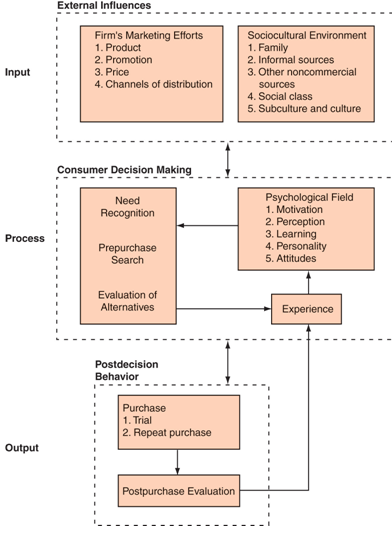
Recommendation to influence UK consumer
The purpose of this report is to suggest the director of Sony to influence each stage of the UK consumer decision-making process –
- The marketers of Sony should consider the feedback of the purchasers to gather knowledge about their emotional stage as UK electronics consumers may like to use a specific brand though many other brands are available in the market. On the other hand, the customers would like to know more information regarding the new products, therefore, the markets have to pass the message to the customer about innovation to final adoption;
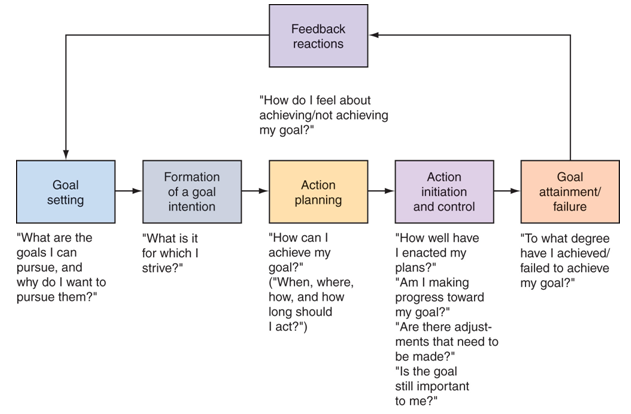
- To develop customer interest in Sony’s eco-friendly products, the marketers should efforts on external influences to change the attitude of the customers;
- As the marketing activities have a direct influence on the customer, Sony should more concentrate on the promotional activities but it must focus customer’s need, product description and social values;
- They must assess the actual need of the different customers of different age groups because some customers may like to purchase MP3 players, HDTV and cell phone but some need more like LCD, digital cable box, digital video recorder, USB flash drive and so on. They must remember that customers may have previous experience to use this product;
- The marketers of Sony should consider the influence of family, friends, and surrounding people and exiting code of behaviour, which are important to know why people buy and how they use the products;
Multimedia Strategy
Multimedia Strategy
Picard (2003) pointed out that the progress in digital distribution channels for multimedia products like auditory, visual videos and studio software through online and satellite technology has generated new dimension of critical thinking to take multimedia strategy by the business world that drives. There are huge multimedia firms who are suffering from difficulties for traditional outlook to their product and service with lacking understanding and absence of a sustainable business model that droved them to stay at the SME or small company status. Some business entries have already formed their multimedia strategy to respond to the changing dynamics of the electronic appliance market. As a pioneer of this market, Sony has previously introduced its multimedia strategy globally but there are huge gaps identified with the existing strategy that urged this researcher to recommend further changes in their multimedia strategy. This part of the report has deliberated with a critical evaluation to reach its intimate conclusion.
Theoretical base of Key External Influences on Consumer Behaviour
Solomon et al (2001), and Schiffman and Kanuk (2006) exposed the consumer behaviour model that there are six different elements of external factors those tremendously influence consumer’s behaviour at any market and these external factors are Culture, Sub-culture, Demographics, Social rank & Status, Family and Reference groups while the consumer’s internal motivations are a further influential factor but left behind this report. For a better understanding of external influence consumer’s behaviour, all the elements are discussed as follows-
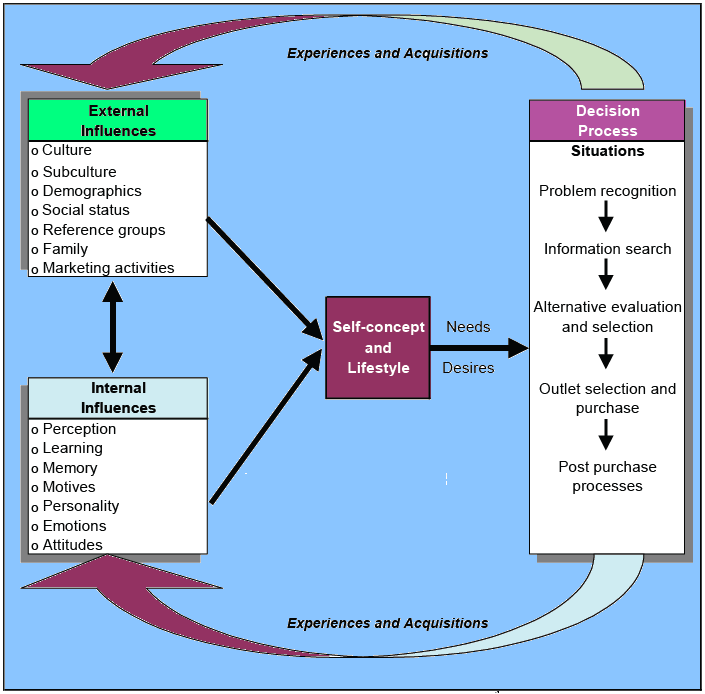
Cultural Influences
Among the external influences on consumer’s behaviour, this is the most reworded issue that a marketer has to take into account. Culture is the most pragmatic coordination of collective values, faith, wisdom, norms, ethic, legislation, and traditions of a community’s incumbents and all the members of similar culture would respond in almost similar ways.
Wetherly (2008) explained in the wider aspect of culture arguing that it involves environment the whole thing those are not integrated within the economics and politics of a community. Economics of a country has structured initially with a market where the people relates with each other as either a buyer and seller or consumer and producer. Politics is the arena where people gather for collective bargaining in the society for the common interest of his community while the politics and economics of a community interlinked using product, services and rules that govern the society. The socio-cultural factors organise with the rest factors of the society with a gigantic involvement with the complete assortment of behavioural aspects of attachment that engages in people for their business and private lives. In the United Kingdom, due to global financial crisis of 2008 and its consequential recessionary economy has been shifting its social trends identified from both public and private statistics while such changes quick restructuring the wider scenarios of its social culture.
Sub-cultural Influences
Within the national culture, there may contain different sub-culture, which essentially influence the consumer’s behaviour while individuals aligned with dissimilar custom, ritual and manners those keep apart from each other. In the UK, within the British culture, there are different sun-culture like Asian British and African British and their preference and test are different from each other by their age, gender, lifestyle, dress, food habits, and ethnicity.
Family and household influences
Office for National Statistics (2007) categorically mentioned that the family and household patterns are going through a changing dynamics composed with parental belongings, marriage, separation, partnering, single living, and second family organising while the husband-wife living with children is a decreasing factor and rate of a broken family is increasing in huge number. According to the statistics of 2006 by ONS (Office for National Statistics) per children living long-term with parents have reduced 24% within the last 34 years through the population size increased almost double.
Family and household, as a micro-unit of a social group, have an almost strongest resource to influencing the on consumer behaviour in such a way that children always follow their parents, some member of the family motivates others, and at the adulthood, people are habituated to behave ‘like father- like so’. The changing configuration of family and increasing number of broken family systematically abolishing single nucleus large families where the families also seriously influence the consumer behaviour to restructure as per their previous liking and choice that belongs to them psychologically.
Income and social class
Income and social classes organise with a few individuals all who carve up almost the same rank and profile, have a similar living standard, and possess identical point in society due to their income equality. Among the social class, individuals are akin to be inclined to uphold the same values, philosophy for their utility maximisation. It has been evidenced that analogous prototypes of behaviour, as well as consumptions of social classes, are categorised as upper and lower status while social classes of diverse classes demonstrate very different from another society and their standing in society. The current ranking of a social class may change in regards to time considering stricture their income enhancement and occupation incensement.
Reference groups
The references groups are assembled with people those who share a variety of common sense of hummer and approaches and similar intellect for social affiliation to communicate among the members of such amalgamation. Reference groups possibly will interact among them by confronting each other and communication would take place regularly like own family, employees association, as well as study groups everywhere the connections would be more dignified rather than private area, for instance, the union of professionals, same political party affiliation and clubs like Rotary and Lions are considered as Reference groups.
Opinion leaders
Valente, Thesenvitz, and Lombardo (2008) argued that in the concurrent era, the nature and dimension of influencing the consumers have e dramatically while the previous practice evidenced that influence is a hierarchical alignment to the model or celebrities endorsements. People now a day consider that advertising may not always speak the truth, so they urge to have some expert opinion who are dependable and trusted and these are the option leaders. To influence the consumers the most pragmatic influence of option leaders have determined with having the impending power to bend to the customer’s behaviour to any direction and ultimate correlation. In the UK, there are huge research-based option leaders and Sony urged to engage them to explore its multimedia products and electronic appliances in the UK market.
Recommended Images & Messages around External Influences
In the United Kingdom, Sony enjoys a great image of richest assortment for consumer entertainment for its multimedia and electronic innovative product line, to explore this image for touching and Influencing consumer’s behaviour possibly will profitable to construct as a progression to memorise positive product messages. A standardised image of Sony product line would necessitate conducting a marketing campaign in the UK market and through this marketing communication; individuals set up their fondness and values to generate buying decision. This report urges to recommend following messages around external influence to motivate its strong customer base-
Sony’s Images
To influencing customer through external factors, Sony must develop its image by evaluating whether the conveyed messages should match with its product image connecting the energy-saving properties, eco-friendly technology, and durability with the cost-effectiveness that could intensify the memory of consumers on Sony’s brand awareness including an image of its innovative product.
For the marketing communication of Sony in UK market, this report suggests mainly four major steps in building strong brand image, that would help to accomplish objectives of the organisation linking with the target audience and these are brand identification, meaning, responses, and relationship. To build a strong brand image, the marketer of the Sony Electronics’ campaign will take some forwarding steps for the target audience and these are –
- The marketers of the Sony’s ‘Multimedia-Electronic’ campaign will develop its brand by using existing brand awareness, knowledge, and image to target audiences by focusing on a brand name, logo, symbols, design, package, and functional performances;
- Also, it will take the help of various Integrated Marketing Campaign activities, for example, mass- media advertising, sales promotions, sponsorship, websites and direct mail or one to one marketing;
- It should focus its competitive advantages to develop and sustain brand identity and equity in the UK market;
- It should develop its brand as a social marketer; so, it is more concerned with telling people how to Sony’s ‘Multimedia-Electronic’ possibly will reshape the life to an improved stage.
Designing a message
To influencing customer’s behaviour through external factors, Sony’s marketing campaign would be designed as follows-
- Message content: It should contain at least three types of message appeals incorporating with rational, emotional, and moral, which would positively enlighten the audience’s self- interest by showing how the electronic and multimedia product line of Sony will solve their problems and maximise their benefits of social, financial, entertaining assistance;
- Message structure: In this purpose, purposeful handling of a decided pattern of the message is required while there are also three options as making an ending or pass it to the audience by preparing a logical argument at first or last and preparing a single-sided or double-sided argument of the product, within them, the 2nd structure will choose;
- Message format: The Internet, newspaper, and magazine ads will require specific headline, copy, illustration, and colour while additional decisions for TV and other electronic media would be generated emphasising regarding message size and position, shape and movement for creating differentiation and special attention.
Reference List
Hitt, M. A., Ireland, R. D., & Hoskisson, R. E. (2001) Strategic Management. 4th ed. South-Western Thomson Learning.
Kotler, P. & Armstrong, G. (2006) Principles of Marketing. 11th ed. Prentice-Hall of India Private Limited.
Launchfire Interactive (2008) 6 Ways to Motivate Consumers Using Interactive Promotions. Web.
Militaru, D. (2010) Consumer Behavior in Electronic Commerce Environments and Fashion Effect. Web.
Office for National Statistics (2007) Social Trends. Web.
Peter, J. P., & Olson, J. C. (2005) Consumer behavior and marketing strategy, 7th edition, Tata McGraw-hill Education: New Delhi
Picard, R. G. (2003) Multimedia Strategies in the Age of Globalisation. Web.
Roll, M. (2011) SONY brand strategy. Web.
Sciffman, L., & Kanuk, L. (2007) Consumer Behaviour. 9th ed. New Jersey: Pearson Education Inc.
Sciffman, L., & Kanuk, L. (2010) Chapter 8 Consumer Attitude Formation and Change. Web.
Sciffman, L., & Kanuk, L. (2011) Chapter 16: Consumer Decision Making Process. Web.
Solomon, M. R. Bamossy, G. & Askegaard, S. (2001) Consumer Behaviour. 2nd ed. London: Financial Times/ Prentice Hall.
Sony Corporation (2010) Annual Report 2010 of Sony Corporation. Web.
UK Trade & Investment (2010) Consumer electronics: The UK is a leading market for consumer electronics in EU rope and the largest market for most cut ing-edge product categories. Web.
Valente, T. W. Thesenvitz, J. & Lombardo, A. (2008) Mass and Interpersonal Communication: Buzz for Behaviour Change. Web.
Wetherly, P. (2008) The social and cultural environment. Web.